The Friends Advance
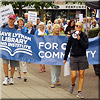 We ask if Fylde has a hidden agenda for the
Institute, and we chronicle two events since our last article about the
Friends of Lytham Institute and Library. We ask if Fylde has a hidden agenda for the
Institute, and we chronicle two events since our last article about the
Friends of Lytham Institute and Library.
First, we report the Friend's march through (a surprised) Lytham Town Centre last Saturday. Next we report a question asked at Fylde Council meeting, before taking a
look at Fylde's behind-closed-doors committee meeting to
consider the Institute's future this coming Monday evening. SYNOPSIS
In our last article we looked at what had been happening since April, notably at
Lytham Town Trust, and what Lancashire County Council had been up to. We also considered
Events at Fylde Council,
and The New Friends Group.
This article begins by asking whether there has been a Hidden Agenda in the dealings so far, and we have news of Fylde's desire to
dispose of the Institute.
Within this section we look at the result of our own Freedom of Information request to Lancashire County Council who (unbelievably) said
no minutes of any of its meetings about moving the Library had been taken or retained. We also look at a reader's own Freedom of Information request to
Fylde BC for further information about a key meeting in 2017.
Next we report the Public Demonstration and March that the Friends of Lytham Institute and Library staged last Saturday (13 July) from the Institute to a
rally at the Assembly Rooms where they also went to look at the disabled access at the rear.
Then we look at the Public Question Asked About the Institute by the Friends of Lytham Institute and Library at last Monday's Full Council
meeting, before looking forward to This Monday's Special meeting of Fylde's Finance and Democracy Committee, at which one of the three exempt
items is about Lytham Library. We then give our personal take on What Might Be In The Secret Report that the F&D Committee will consider.
Finally, we conclude with a look forward - trying to forecast What's Likely to Happen Next.
A HIDDEN AGENDA?
For some time it has been clear to us that Fylde's deafening silence in respect of the future of Lytham Library and Institute was not - as they claim - a desire to avoid
influencing the decision of the County Council in its provision of a library service in Lytham.
It was an attempt to mask a hidden agenda to get rid of the Institute after the library closed.
It is no part of Fylde's role to avoid influencing other leisure providing organisations.
Quite the contrary, in fact.
Firstly, there was (and is) no statutory reason preventing Fylde from lobbying LCC to continue to use Lytham Institute as a base for the Library - it's where local people want to
see it remain.
Secondly, the Institute is a building managed by FBC for leisure purposes, and the Council's Terms of Reference clearly set the responsibility for such buildings within
the remit of the Tourism and Leisure Committee. They have responsibility for what takes place in the Institute.
Thirdly, that same Tourism and Leisure Committee is required to ensure that the leisure service needs of local people are met. The Committee provides some of those
leisure services through its direct employees (e.g. Ashton Gardens). Others it supports and enables through other organisations (such as
the Swimming Pools managed by the YMCA, and Lytham Hall which has been financially supported, and Lowther Gardens Trust - which continues to be funded by the Tourism and
Leisure Committee).
So even when leisure services are not directly provided by the Council, the Tourism and Leisure Committee still retains responsibility for meeting local leisure needs. They have representatives on a host of external leisure
organisations to keep track of what's going on, and to influence provision within those external organisations.
But there has been an abject failure of Fylde's Tourism and Leisure Committee to consider the needs of Lytham residents in respect of the library service and to lobby the
County Council for what it thinks Lytham needs in this regard.
Apart from having received a report about the closure of
Lytham Library back in 2016, Fylde's Tourism and Leisure Committee has not raised or debated the issue of what level of service is needed in Lytham, nor where it should be provided.
It is almost as though the Committee has been gagged and not allowed to debate it.
Every opportunity to try to raise it during meetings has been closed down.
When this sort of thing happens, those who understand the machinations of a local council sense a hidden agenda.
Examples of this perception came from two ladies who separately who wrote to the Lytham St Annes Express last year. One said
'Come on Fylde Borough Council, let us know what is going on!'
And another said
'It has become increasingly clear that the main obstacle to re-opening the library in Lytham Institute is Fylde Borough Council itself. They give every
indication of wanting to rid themselves of the Institute, which was given to them in 1917 by the people of Lytham for safe keeping and management. Fylde have under-managed and
under-valued the Institute for years, and have simply regarded it as a drain on their finances. They have tried in the past to off-load it and continue to do so.'
That was a view we shared.
Eventually, in the last month or so, we discovered evidence of what had been really going on behind the scenes and, in our last article, we published an extract from a shocking email sent by Fylde's Chief
Executive to Lancashire County Council back in October 2017 - (It had only just come to light in a batch of documents released under a Freedom of Information request.).
Speaking of the Library, Lytham Institute and the Assembly Rooms, he said:
' ......the Leader and myself met with Councillor Smith and discussed the options your team is now investigating and we would be happy to assist with any feasibility study
if we can.
Whilst both assets are owned by Fylde Council they are surplus to service delivery requirements, the Assembly Rooms are under a long term lease arrangement with Lytham Town
Trust and the former library building is a financial liability that the Council is must [sic] address under the legal requirement to deliver best value for the tax payer.
A change from the current situation is something that Fylde has been proposing for over five years.'
So, although almost no-one knew about it in 2017, according to the head of Fylde's officers, the Institute was a seen as a financial liability, and both it and the
Assembly Rooms were said to be 'surplus to service delivery
requirements.'
There was no proper basis for this view to have been expressed.
Before this shocking fact was public knowledge, we were already starting to get suspicious about a hidden agenda regarding the Institute, and we wanted to better understand what was going on behind the scenes.
We suspected that meetings were taking place between the various parties, but nothing was being made public.
That often means something is afoot that is not going to be popular.
In particular we wondered exactly how and when the Lytham Assembly Rooms came to be identified as a suitable venue to host the library, and how the Lytham Town Trust
came to be invited to submit a business case to house the Library service.
Freedom of Information Request to LCC
So we used the Freedom of Information Act to ask the County Council to supply copies of whatever information the County Council held about the Institute, Lytham Library and
the Assembly Rooms with respect to its contacts or correspondence with Fylde Borough Council, Lytham Town Trust, and other parties.
They took an awfully long time to reply, but eventually apologised for the delay and said:
"On 4 September 2017 a series of meetings took place locally with representatives of the Friends of Lytham Institute & Library, Lytham Town Trust, and
Fylde Borough Council, in order to gain a local view on the future of library provision in the area.
During these meetings reference was made to The Estate Office at Hastings Place (owned by Lancashire County Council), Lytham Institute and Lytham Assembly Rooms
(both owned by Fylde Borough Council) as publicly owned buildings in the area. There are no minutes for these meetings.
On 12 January 2018 meetings were held with representatives of the Friends of Lytham Institute & Library and Lytham Town Trust respectively. Each meeting
focussed on the county council's invitation to each group to submit a business case which offered a sustainable solution and met the county council's requirements for the
delivery of a Band C library. There are no minutes for these meetings.
The reports to cabinet referred to in your request set out an options appraisal which took into account the business cases submitted by the Friends of Lytham
Institute & Library and Lytham Town Trust respectively, alongside other property related information, in order to determine which premises would provide a suitable and cost
effective option for delivery of a Band C library in the area, in line with the county council's Libraries Strategy".
This answer suggests that no record of any of these meetings was made.
We found that statement very difficult to believe.
Furthermore, we had not asked for Minutes per se. We had intentionally been broad in casting the net to include all contacts and correspondence.
This should have included emails, together with officers handwritten or computer added file notes, diary notes and of course any formal minutes.
We appreciate it could simply be LCC being difficult and trying to fob us off by saying there were 'no minutes.' (Their Freedom of Information folk will
undoubtedly have understood the breadth of our request, and in chasing correspondence with them, we sensed their exasperation with the service department who kept failing to deliver the
information we requested).
We did consider following it through to the Information Commissioner, but it seemed to us that LCC's service department was not going to admit to there being anything to
provide, so we reluctantly accepted further chasing would not be the best use of our time.
But to this day, knowing how councils work from the inside, we simply cannot believe there was no written record of any sort regarding these meetings.
This simply adds to the perception that something is being hidden.
Freedom of Information Request to FBC
And we're not the only ones who feel like that.
One of our readers has been chasing Freedom of Information requests on their own account, but has since shared with us their questions and the answers they received.
It was their FoI request that first exposed the shocking email we've reproduced above from Fylde's Chief Executive.
Having noted that email, our reader asked for further information about the meeting (in blue text following. The answers from FBC are in bold green text).
They wanted to know:
-
The date of the meeting involving Allan Oldfield, Councillor Fazackerley and County Councillor Smith concerning library provision in Lytham, referred to in
correspondence between Mr Oldfield and LCC's Head of Asset Management?
'The meeting took place on 4 September 2017.'
- Who attended that meeting?
'The individuals named above, plus Councillor Tim Ashton. (This is based on individual recollection)'
Once again we see a denial that any record of an important meeting was kept or retained.
If what has been said is correct, we think it risks being seen by the public as officers and councillors colluding together outside of the formal
decision-taking process to avoided the existence of
documentation that would record what took place.
We're also at a loss to understand why Cllr Ashton was present at this meeting - and in what capacity he attended, (i.e. whether he was there as a Borough Councillor, a
County Councillor or a representative of Lytham Town Trust).
In thanking FBC for providing the information, our reader also told them.....
"I have to say, with the greatest respect, that I find it hard to credit that no official record was made of such an important meeting between two local
authorities, which set in motion the highly controversial, unpopular and (as it turned out) ill-conceived plan to move the Library to the Assembly Rooms so that Fylde could
dispose of the Institute."
We cannot but agree.
For both Fylde and LCC to suggest that no written record exists relating to these meetings is - literally - unbelievable.
It also deepens the atmosphere of distrust and suspicion in which Councils like Fylde now find themselves operating.
It confirmed what the Chief Executive's email had said.
Someone in Fylde had an unspoken desire to get rid of the Institute.
It's not as though Lytham Institute was unused. It contains a fantastic archive of local history operated by the Lytham Heritage Group that the public can
consult by appointment. We've been there ourselves several times seeking early maps and other historic information. It is a terrifically important resource that ought to be
better valued and more readily available than it is.
Furthermore, we know the lady who, since 1995 has hired the Hewitt room (and currently still hires it) for two evenings every week running dog
training classes for local people.
Then there are the occasions when the Hewitt Lecture Room has been hired by local groups for meetings - we've been to three meetings held there within the last
12 months by the Friends group alone and we imagine there have been more that we don't know about.
So it's not as if the building was unused or redundant when the Library closed. Nor was it the case that getting rid of the Institute was an adopted policy of
the Council. Disposal or closure had not been on any committee agenda, let alone been a decision of the Council.
So what we see here is an 'unofficial' decision that the Institute is surplus to service delivery needs when it is not.
It is what many - including us - would call a 'hidden agenda'
What we see is an agenda to quietly run down the services available through the Institute in order to be able to say - no one wants to use it now, so let's
sell it off for development.
And it has to remain a hidden agenda because those involved in this duplicitous endeavour know full well the voting public would not support what they want to
do.
PUBLIC DEMONSTRATION AND MARCH
That public distrust boiled over last Saturday when the re-invigorated Friends of Lytham Institute and Library held a protest demonstration and march through Lytham.
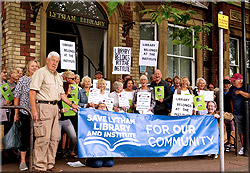
Several of the Friends (we estimated about 40 people) assembled outside Lytham Library with placards to display their message, and leaflets to hand out
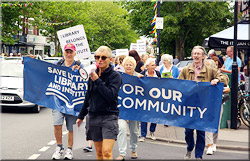
At 11am, they set off to walk through the town centre - much to the surprise and bemusement of Lytham shoppers on a busy Saturday morning. (Sedate Lytham town centre is
not used to seeing protest matches led by an energetic youthful, megaphone wielding activist who pulled no punches in her oral criticism of what Fylde council were doing)
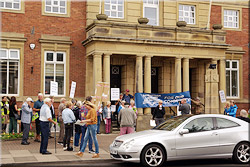
The march ended at the Lytham Assembly Rooms where the Friends rallied support and handed out more leaflets.
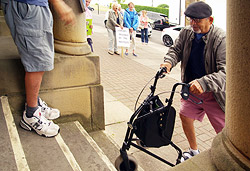
One chap ably illustrated how difficult (if not impossible) it would be for people with mobility problems to get into what is set to become the new home of the
library using the front door.
And as we have shown already, the disabled access at the rear is, in our view, frankly insulting to those with disabilities.

If you are unable to access the main front entrance to the assembly rooms it involves a trek around the block to the awful rear entrance where, from what we could see, all
the parking spaces had signs in place reserving them for others.
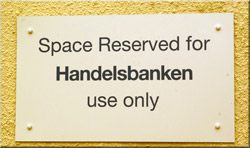
We would have thought this is something neither the County Council nor Fylde Council would be proud to offer as the only access for those with a disability.
|
The protest march last Saturday was well timed because the matter of the Institute and the Library cropped up unexpectedly at the meeting of the full Council last Monday.
FULL COUNCIL LAST MONDAY
In our June article on the Institute and Library, we said:
'Despite the hidden agendas and despite the secrecy being used to hide the real facts, as more of the story is brought into the public domain, it becomes clear
that Fylde Council's behaviour in this matter has been - and remains - a public disgrace.'
Sadly, we don't think that's about to improve anytime soon.
At Fylde's full Council meeting on 15 July, the Press and Outreach Officer for the Friends of Lytham Institute and Library addressed Fylde Council in the Public Question
Time session at the start of the Council Meeting.
Our readers can see the full extent of this Q and A exchange on Fylde's YouTube Channel,
(starting at about 8 minutes 50 seconds into the recording) but we now reproduce the gist of it below...
His question was based on comments made in a letter the Friends had received from LCC. We quoted LCC's Chief Executive on the relevant section in our last Article - where we said
'Subsequent to their progress-chasing letter sent to LCC after the 11th June meeting, a reply from LCC has just been received by the Friends. It contains the
following statement:
"Lytham Institute is owned by Fylde Borough Council and as such the borough is responsible for determining any future use of the premises and in this
regard we have not been asked to remain within the premises."
The question asked at Fylde Council last Monday night was: Bearing in mind what LCC had said,
'....How does this lack of effort on the part of Fylde Council square with its responsibilities to the people of Lytham, who have expressed a clear wish to see
the library back at the Institute, as well as its responsibilities as charity trustee of the Institute to secure the building for the benefit of the community?"
The reply came from Cllr Susan Fazackerley who said she had contacted the (LCC) author of the letter the Friends had quoted from, and he had told her that his remarks
"....were taken from a lengthy response to correspondence which contained a paragraph stating that: Lytham Institute is owned by Fylde Borough Council and as such, the
Borough is responsible for determining any future use of the premises and in this regard we have not been asked to remain within the premises.
Our occupation of Lytham Institute was facilitated by a user right, however this does not compel the Council to remain in the premises, nor to provide a
library service from there in perpetuity."
She went on to say the decision not to remain in the institute and to remove the user rights was made by LCC, and had been based on economic grounds as a result of the
reduced size and operation of the Library service.
She added that if they had chosen to remain in the Institute, Fylde would have fully supported them in this and, indeed she said that under the user rights they could not
have prevented it.
She went on to say that the matter of Trust status is currently the subject of legal correspondence.....
"..... and until that is resolved it would be inappropriate to comment"
What an answer she gave.
It perfectly shows how duplicitous Fylde is become under her 'Leadership' and how they are no longer worthy of public trust.
First she tries to insult the questioner and insinuate that because it came from a longer letter, the LCC officer's remark somehow had less value or validity.
What absolute tosh.
Second, it is only not appropriate for her to comment further if she chooses to remain within the mould of 'Enemy of the People' that she has cast for herself and her
Conservative group as they try to exclude transparency from democracy in the matter of the Institute.
She knows full well - and quite possibly had a hand in insisting - that both the Institute and Assembly Rooms are to be considered
"....surplus to service delivery requirements, ..... and the former library building is a financial liability...."
She knows that because she was at the meeting in 2017 following which the Chef Executive sent his email to LCC.
And that's the same meeting that LCC also told us there were no minutes for - when what we had asked for was copies of information regarding contacts and
correspondence in this matter.
That looks to us like either incompetence or deception on the part of the service department at LCC.
We've digressed again. Back to the main story.....
The public question time at a Fylde Council meeting allows a speaker to have one follow up question based on the answer given, and the Friend's Press Officer seemed to think that the answer
he had been given did
not address the question and, after trying to explain why he remained unclear, he asked
"... So there's a pending legal opinion that indicated that Fylde Borough Council did not own the Institute. It holds it as a trustee. It was a responsibility of the
Institute [we think he probably meant to say 'the Council'] to ensure that it could be properly maintained. The Library of course is Lancashire County Council. The
question was why did Fylde Borough Council make no effort to maintain the library so that the institute would be properly maintained as a charity trustee"
Cllr Fazackerley replied again.
This time she either misunderstood his use of the word 'maintained' - or she chose to sidestep the matter again.
Either way, she avoided
answering his central point about maintaining the Library in the Institute which, of course, helped to make it financially viable.
Instead, she spoke of money that the Council has spent on building maintenance at the Institute over the years. She also said:
".... And that building, I have to reiterate, prior to the library being removed from it, was only used on a Tuesday night for dog walking, and the keeping of several
archives on the history of Lytham on the first floor.
So it didn't really need to be, to have an awful lot of money spent on it except for essential maintenance during the time
that the usage was so small.
The question of the legal status of who owns the Institute and how all this goes forward, we have as you may know, a special meeting of one of our committees - the Finance
and Democracy Committee - next Monday night when suggestions will be made as to the future of that building. I can say no more at this point."
She was wrong about the use of the Institute of course.
If she had taken the trouble to attend any of the Friends meetings at the Institute she would have seen them taking
place.
She should also have known that the dog training classes were on two nights a week not just a Tuesday.
She was also wrong to say she could say no more at this point.
She could have said a great deal more, but she chose not to do so.
It was a case of 'won't' rather than 'can't'
THE IMPENDING F&D MEETING THIS MONDAY
As required, an Agenda for Monday night was published in advance of the meeting - but readers shouldn't get their hopes up because whilst it has three items of business for decisions, all of
them are shown as 'Exempt'
This usually means that the report accompanying the agenda item is not published.
It also means that any newsprint press and 'other media' like us (which the Localism Act terms 'Citizen
Reporters'), together with any members of the public present at the meeting, are excluded from it and have to leave.
Fylde's Conservative group, (or the officers who produced the report) are trying to ensure that secrecy in the matter of the Institute remains, and that the decisions and debates take place behind closed doors
yet again.
So because the report for Monday's meeting has not been published we can't bring our readers our take on what it says.
What we can do however, is draw on our experience of such matters, and on the report that was made to the Council in 2005 (by the same officer, who based his
2005 advice to the
council on the Opinion of the same barrister that Fylde has used again this time).
And using that experience and precedent, we're happy to try to predict what we think the report to Fylde on Monday night will say.
So what follows is not fact, it is our own take on what's likely to be in the secret report.
OUR TAKE ON THE SECRET REPORT
Like the Lowther Gardens report from 2005 it's likely to begin with a statement about the history of the building and a history of events leading up to the report being
made.
It will probably go on to explain the relationship and financial arrangements between Fylde and Lancashire County Councils regarding use of the Lytham Institute and Library building
for leisure activities, lectures, meetings and, of course the library.
We've covered all of that in our previous articles so we won't go over that ground again here.
We think it will also speak about the budget for the Library because if (as we believe) the building and the services it has provided are held on trust by Fylde Council,
then the accounts for it will have to be separated out from the generality of the Council's own accounts, and it will have to have its own separate and published accounting
regime.
The report will also rehearse the arguments for and against trust status being applied.
This is going to be a tricky area because Fylde got its own barrister's opinion on this very matter around 2012, and (although they have never released it in public) they have always maintained
it said they did NOT hold Lytham Institute on charitable trusts.
However, the Lytham St Annes Civic Society - which was in turn part funded by a very generous donation from local historian Brian Turner - engaged Lytham Solicitor David Coup to instruct
their own barrister for an opinion on this matter.
Mr Coupe sought the opinion from Francesca Quint.
We know Mrs Quint from personal experience of her judgement and we also know she is one of the top charity law barristers in the UK.
It used to be the case that she worked in the same chambers as the barrister FBC had engaged, and we understood she was more experienced and senior than he was.
She has also
advised the Charity Commission itself on charity law matters. We're not sure if that is still the case.
Either way, she was unequivocal in her opinion, saying:
"The deed of assignment declared that the Council took the premises, not for the purposes of the Institute and not for the local authority's corporate purposes,
but 'upon trust to maintain the said premises and the buildings now or hereafter erected thereon for public use under the provisions of the Public Libraries Acts 1892-1901
and the Museums and Gymnasiums Act 1891 or any Acts re-enacting or amending the said Acts or any of them'.
I have no hesitation is advising that those words created an exclusively charitable trust for the benefit of the public."
So, knowing her as we do, we have no hesitation in saying her opinion would trump that of almost any other barrister.
We also understand that, once they had seen Mrs Quint's Opinion, the Charity Commission wrote to Fylde in pretty unambiguous terms advising them of their responsibilities as a
Charity Trustee.
That's why, having seen (and published) Mrs Quint's Opinion, we have consistently maintained that Fylde WILL be obliged to register and operate the Institute as a Charitable
Trust.
So the tricky bit for the secret report on Monday comes for either Fylde's officers - who will now have to explain why the advice they gave the Council was not accurate, or for the barrister they engaged
(and supposedly relied upon) to explain why his advice now has to change.
Like we said. Tricky.
We've no doubt at all.
Mrs Quint's view will prevail.
Her opinion will carry a lot of weight with the Charity Commission.
And although we're not much for gambling, we'd say that the chances of Boris Johnson being elected to the Conservative leadership are about the same as Fylde being recommended, and deciding to, register
Lytham Institute and Library as a Charitable Trust.
The only alternatives facing Fylde would be either to do nothing - and face prosecution from the Treasury Solicitor in the Attorney General's department of Government who
prosecutes recalcitrant councils in the public interest.
Or to take the case to law themselves and spend another shedload of taxpayers money (in addition to the £175,000 or so they are already ready to waste
at Lowther Gardens - which we understand now looks set to come to a head in early autumn.)
Up against the in-depth historic research done for Mr Coupe by local Historian Brian Turner, and Mr Coupe's brilliantly incisive presentation of that information to Mrs Quint, and her interpretation of its meaning into her
authoritative legal opinion, we would say that, in the vernacular, Fylde has been well and truly 'stuffed'
We find it ironic that Fylde's use of secrecy and a hidden agenda in this matter has caused public confidence to wane, and for trust in the Council to become so lacking that
local people had had to rise up in anger to fund their own legal opinion that we are confident will now stop Fylde disposing of the building which many believe was their
original aim.
Self-defeating, or what?
The Lytham St Annes Civic Society's legal opinion has almost certainly killed off any plan Fylde had to dispose of Lytham Institute, and Lytham owes a great debt of gratitude to Mr Turner, Mr
Coupe and the Civic Society who, together, brought this about.
SO WHAT'S LIKELY TO HAPPEN NEXT?
Well, here again we're supposing what the next steps will be based on previous experience.
The first is likely to be that Fylde will register the Institute as a Charitable Trust with the Charity Commission.
We expect they will begin with the Council remaining the sole Trustee - because that way they will have greater influence on the sort of uses to which the building might be
put.
In time we're sure that will change, and in one form or another, new Trustees will assume operational responsibility, with Fylde (probably) retaining the equivalent of
a 'Golden Share' as the named Trustee in a new Governance Document for the Trust.
One of the first decisions will be what the name of the new Trust should be. The obvious one, based on its current trusts and on history, would be something like 'Lytham
Institute and Library Trust'.
But with Fylde (foolishly in our view) having agreed to let the library go into the Assembly Rooms the question of removing the word Library from the Trust's name will
automatically come to the fore.
That is unless, even at this late stage, either LCC can be persuaded to change its mind and re-establish the library in the Institute, or unless Fylde itself encourages
the establishment of a community operated library in the Institute, perhaps linked to the wonderful archive of Lytham and Fylde documents and memorabilia maintained by Lytham
Heritage Group.
The next thing - and this might have already begun - is that Fylde will seek to 'update' - for which you can read change - the trusts on which they currently hold the
building.
They might argue that the future operation no longer needs to mention the word library, (because they will say that's going to be in the Assembly Rooms.)
We think they
will also try to get some element of income-generating commercial activity within the building in order to compensate for the loss of the money LCC were paying toward their use
of space there.
Suddenly, it will dawn on those Fylde councillors who have been supporting the Conservative group leadership that it has been a very foolish decision to allow the Assembly
Rooms to change their lease and have the LCC Library money fund Lytham Town Trust, rather than the Institute.
Concurrently with this, Fylde will open discussions about the future of the Institute. They will want to show the Charity Commission they have the support (or at least
acceptance) of the people who are supposed to benefit from the trust.
At this point, things could go two or three ways, and we think Fylde needs to be careful about how they approach this.
If, having lost the argument about charitable status, Fylde genuinely want to recover some public trust, they will have to be prepared to embrace the desires of local people
for the Institute, and the Friends view - at least at present - is firmly set on restoring Lytham Library to its traditional home in the Institute.
That's likely to be an uncomfortable but necessary path to be trod if Fylde's aim is to carry the local community with it.
The other way it could go is that Fylde will pay lip-service to public consultation, but will try to set up something where local organisations will have to compete with
each other to operate the Institute for the future.
We're thinking here about how Fylde created - or at least used - a 'bidding war' between two community groups that had alternative views for using the former Scruples site on
Lytham beach.
We thought that approach was, and in this instance it would still be, the wrong way to go. But we can see it would have appeal to some within Fylde's Conservative group.
The third - and much less attractive - option we can see would be to try to hive off the Institute to a separate charitable trust - either an existing one (or perhaps a
newly created one), so Fylde can advance their original aim of ridding themselves of the liability of the Institute which their leadership has seen as being 'surplus to
their service delivery requirements'.
So whilst we're confident Fylde will decide on Monday to register the Institute as a Charitable Trust, we're not at all clear what's in the mind of the leading Conservative
majority party and the officers who serve them.
And that has to remain a worry for the time being.
But what has happened without doubt is that momentum is being carried during the current advance of the newly invigorated Friends of Lytham Institute and Library
Dated: 19 July 2019 
|